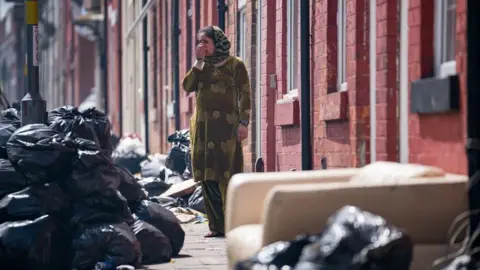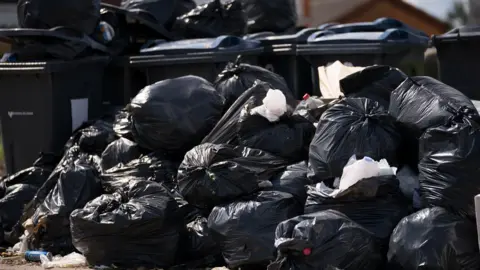Bin row: What's going to happen to Birmingham's rubbish?
 Christopher Furlong/Getty Images
Christopher Furlong/Getty ImagesAs the latest dispute between Birmingham's bin workers and the city council rumbles on, residents will changes in how their rubbish is collected.
The council has brought in a contingency plan in a bid to keep the streets clean while industrial action continues and a series of strikes take place.
When will workers walk out?
 Mike Kemp/Getty Images
Mike Kemp/Getty ImagesBirmingham City Council switched to fortnightly collections from Monday 18 February, to last until its dispute with unions Unison and Unite is resolved.
Usually, city residents get a weekly general waste collection and a recycling service every two weeks.
During the temporary service people should put both bins out on their recycling collection day.
Meanwhile, union members plan to walk out two days a week, which they started on Tuesday 19 February.
Unite said further strikes would take place on 22, 27, 28 February and 4, 8, 12, 13, 21, 22 March.
While Unison says the first strike by its members will be Friday 22 February.
What can I expect?

While the contingency service is in place, crews will dispose of rubbish "in the most effective way possible" to keep the streets clean, the council said.
It said it may mean general waste and recycling were mixed.
The bins will be collected seven days a week between 06:00 and 22:00 GMT.
Because of that, people should leave their bins out if they are not picked up by their usual collection time.
During the dispute, two or three sacks of "side waste" can be left out alongside bins and people can also use the city's household recycling centres.
How are the council letting people know?
Allow X content?

Information about the changes are being shared through the council's social media and on its website.
Anyone unsure of their recycling collection day can find out by visiting its "check your collection day" page.
Why has this happened?
 Christopher Furlong/Getty Images
Christopher Furlong/Getty ImagesUnite workers went on strike for three months in summer 2017 in a dispute over job losses, which saw thousands of tonnes of rubbish piled up on streets.
In December 2018, workers voted to take fresh industrial action over claims Unite members had been denied a council payment made to GMB members who did not participate in the strikes.
The council and GMB said the payment was a settlement because GMB was not consulted during the talks that ended the action.
Unite then announced the action would be "escalated" to strikes, saying it had not had a "satisfactory response" from the council.
Both sides are now pursuing legal action.
After its last offer to the unions was rejected, the city council said it had been left with no option but to take legal action to end the industrial dispute.

Follow BBC West Midlands on Facebook, on Twitter, and sign up for local news updates direct to your phone.
